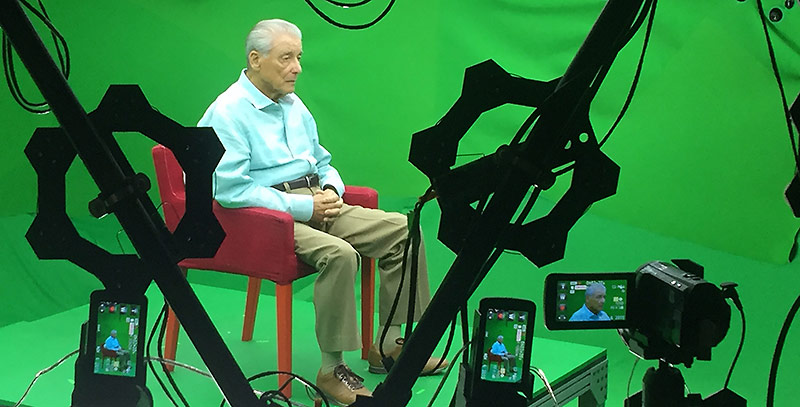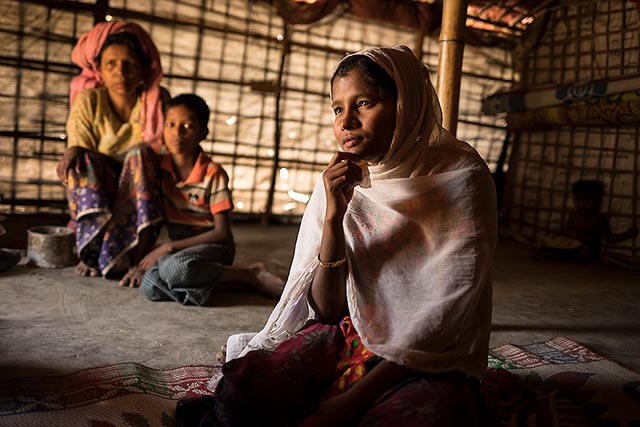News By Year and Month
South Sudan testimonies underscore dangers of a troubled region
Editor’s note: This story is part of a series highlighing the Institute's work in connection with various genocidal conflicts for Genocide Awareness Month, which occurs in April.
South Sudan is…
Monday, April 30, 2018
USC Playwriting Class Draws Inspiration From Archive
Playwrights are informed by a variety of sources– their own imaginations, the life events of their friends and family, the things they see in their own daily goings-on. And now, a whole other…
Thursday, April 26, 2018
‘The Girl and The Picture’ to Screen at Tribeca Film Festival
There is a scene in The Girl and The Picture where an 88-year-old Chinese woman, while walking through the streets of Nanjing with her granddaugher and 7-year-old great-grandson, spontaneously jumps…
Thursday, April 26, 2018
At 103, Still Going Strong
Frieda E. Roos van Hessen was born five years before women won the right to vote, 12 days before Babe Ruth hit is first major league home run and 13 days after Charlie Chaplin released “The Tramp…
Wednesday, April 25, 2018
Rare Armenian Photographs Now Available in IWitness
Rare primary-source photographs that focus on the life and culture of the Armenian people before the Armenian Genocide and the resiliency among the ensuing diaspora have been integrated…
Wednesday, April 25, 2018
'The Last Goodbye' Wins Two Webby Awards
The Last Goodbye, the virtual reality film about Holocaust survivor Pinchas Gutter produced in partnership with USC Shoah Foundation, is the winner of two Webby awards, it was announced today.
…
Tuesday, April 24, 2018
Why the United States doesn’t recognize the Armenian Genocide
Although the Armenian Genocide is recognized in states and cities across the country, the issue remains unresolved on the national level.
During a talk on April 19, Julien Zarifian outlined…
Tuesday, April 24, 2018
IWalk: Memory, Testimony, and Activism
In my role as part of USC Shoah Foundation’s Education Department, I have the honor of working with our team members both in the United States and around the world to create localized educational…
Monday, April 23, 2018
Survivor of the 1994 Genocide Against the Tutsi in Rwanda Promotes Peace Through Soccer
April is a difficult time for many in Rwanda, as it marks the month when government-backed militias of ethnic majority Hutus murdered over a million people – mostly minority Tutsis – over a period of…
Monday, April 23, 2018
The Warsaw Ghetto Uprising: A tribute
Seventy-five years ago today, on the eve of Passover, German forces entered the Warsaw Ghetto with intentions to liquidate. Through loudspeakers, Nazi troops called for Jews to emerge from their…
Wednesday, April 18, 2018
Filmmaker to give full footage of genocide trial in Guatemala to USC Shoah Foundation
It was 1982, and the Guatemalan government’s scorched-earth campaign to eradicate indigenous villages under the pretext of crushing a communist rebellion was in full tilt.
Even so, the dictator at…
Tuesday, April 17, 2018
Cambodian Genocide: 43 Years Later
Forty-three years ago to the day, a communist regime known as the Khmer Rouge conquered the Cambodian capital of Phnom Penh. The occupation set in motion a four-year campaign of genocide that…
Monday, April 16, 2018
Armenian Genocide Researcher Stumbles onto Surprise that Hits Home
As the program officer of USC Shoah Foundation’s testimonies from the Armenian Genocide, Manuk Avedikyan has pored over thousands documents detailing the names of survivors and towns they came…
Friday, April 13, 2018
Pioneering "Dimensions In Testimony" interviewee passes away at 85
USC Shoah Foundation is saddened to learn of the passing of Aaron Elster, a Holocaust survivor whose steadfast refusal to counter hate with more hate will echo for years to come. He was 85.
…
Friday, April 13, 2018
Holocaust Survivors Inspire Students to Become Messengers of Memory
Story by Jessica MyLymuk
How then could I ever truly preserve your memory?
My efforts to record those six years of your life will be
As inadequate as the food you were given in the ghettos,
…
Thursday, April 12, 2018
Honoring My Grandfather’s Legacy
It’s a story my grandfather never told me, something that I only heard and understood later, years after my mother recounted it. In 1943, after his first wife and children were killed, my grandfather…
Monday, April 9, 2018
Women at Nuremberg: Edith Coliver
Editor’s Note: Narratives surrounding the Nuremberg Trials overwhelmingly focus on the men. From U.S. Supreme Court Justice Robert Jackson to the notorious Nazi leader Hermann Goering, the legacy of…
Wednesday, April 4, 2018
Rohingya survivor: Myanmar government “wanted to punish me for telling the truth.”
Editor’s Note: Jamalida, a Rohingya survivor, begins our Genocide Awareness Month focus on new testimony collections in the Visual History Archive. Her testimony and others will be featured in an…
Tuesday, April 3, 2018
Kathryn Brackney Lecture Summary
"Phantom Geographies in Representations of the Holocaust"
Kathryn Brackney (PhD Candidate, Yale University)
2017-2018 Katz Research Fellow in Genocide Studies
March 22, 2018
Kathryn…
Monday, April 2, 2018
Mélanie Péron Lecture Summary
"Étoilement: The Starring Effect"
Melanie Peron (University of Pennsylvania)
March 15, 2018
On March 15, Mélanie Péron from the French department at the University of Pennsylvania…
Monday, April 2, 2018
Jennie Burnet Lecture Summary
"Good Amidst Evil: Rescue During the Rwandan Genocide"
Jennie Burnet (Georgia State University)
March 1, 2018
Jennie Burnet, Associate Professor of Anthropology at Georgia State University…
Monday, April 2, 2018





